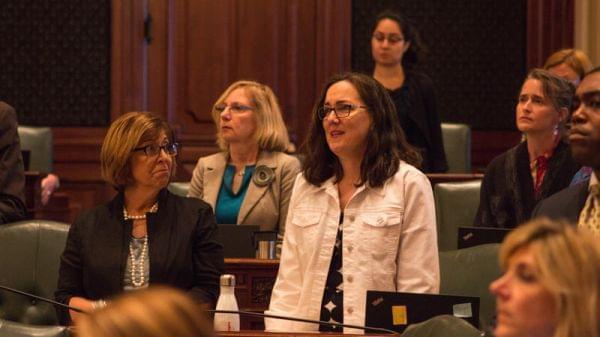Illinois House Approves Abortion Rights Legislation

State Rep. Kelly Cassidy, in white, watches as the Reproductive Health Act passes in the Illinois House. The Chicago Democrat sponsored the legislation. Brian Mackey/NPRIllinois
The Illinois House on Tuesday passed legislation meant to protect abortion rights in case Roe v. Wade is overturned.
The legislation would prevent doctors from being criminally charged for performing abortions at any stage of pregnancy.
Republicans argue it would also expand access to abortion procedures after a fetus is viable. But supporters say it doesn’t change current practice, which allows abortion after the first trimester only when it’s critical to the life and health of the mother.
State Rep. Anna Moeller, a Democrat from Elgin, says opponents really want an end to safe and legal procedures.
“The opposition doesn’t trust women and it doesn’t trust doctors to make ethical, deliberate and compassionate decisions when it comes to women’s healthcare,” Moeller said. “I find that offensive and disturbing.”
Under the legislation, doctors would determine whether a post-viability procedure is necessary based on the patient’s physical, emotional and familial health. Republicans say that’s too broad.
In an unusual move, Republicans deferred almost all their time to one colleague: state Rep. Avery Bourne, from Raymond, who’s pregnant. She went back and forth with the legislation‘s sponsor, state Rep. Kelly Cassidy, a Democrat from Chicago.
“How broad do we intend for this to be?” Bourne asked.
“A doctor will make a decision based on the accepted standards of medical care,” Cassidy said.
“Could you give me any parameters that we’re asking this doctor to make?” Bourne asked.
“I am not a doctor,“ Cassidy replied. “Doctors decide. And doctors decide based on the accepted standards of clinical care.”
The legislation, Senate Bill 25, also known as the “Reproductive Health Act,” passed on a vote of 64-50. It still needs to be approved by the Senate and signed by the governor before it can become law.

